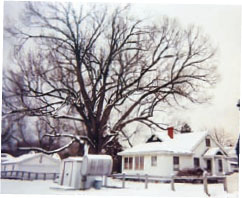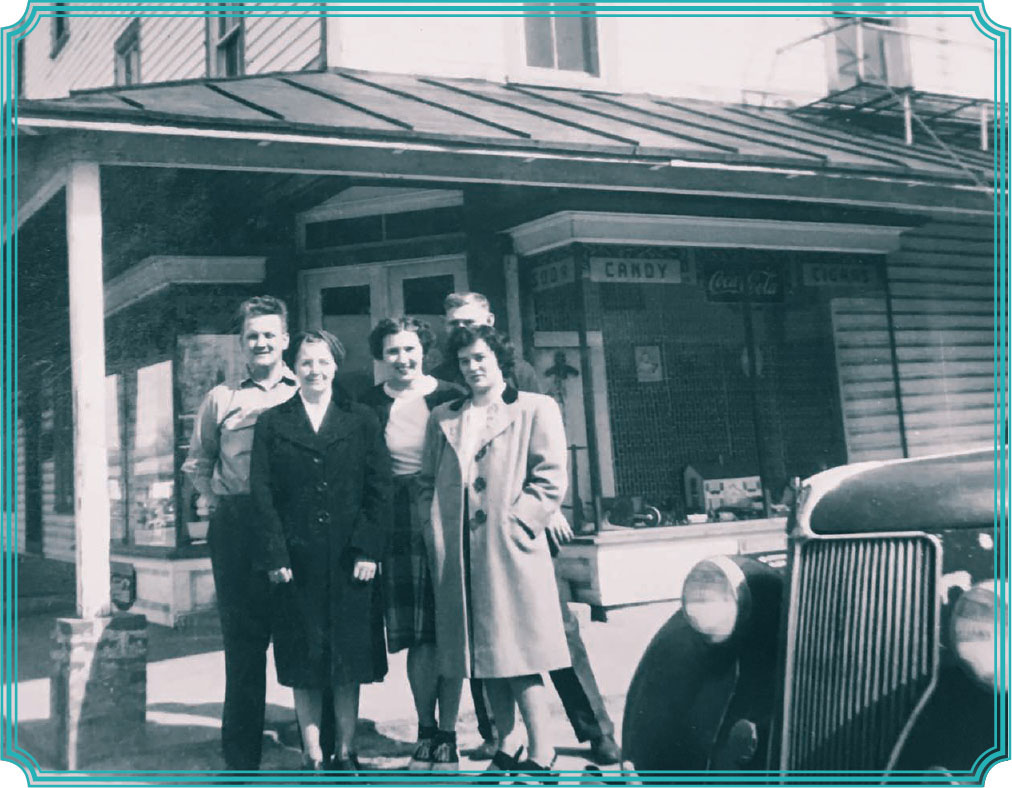
A WHOLE DIFFERENT WORLD:
The Sydnors

Whether it was back in the mid-1900s or in 2016, one unifying thread for people who’ve found their way to Colonial Beach from Washington, DC, Northern Virginia or any other big city is that this little town on the Potomac River is “a whole different world.”
No one is able to describe the differences better than the Sydnor siblings, who grew up in Washington, but spent their summers coming to Colonial Beach and staying in the house their father built in the late 1930s. They eventually retired to the town they loved.
Edna Edmondson is the oldest of the three, Luke is the youngest, which puts Betty Wilson smack in the middle, “where I really suffer,” she jokes.
The story is told that if their mother “hadn’t been in such a hurry to make the ferry,” Betty would have been born in Colonial Beach.
Once the three of them start reminiscing about Colonial Beach, the stories and laughter don’t stop for a minute. Neither do the occasional tears as some memory or another strikes a particular chord.
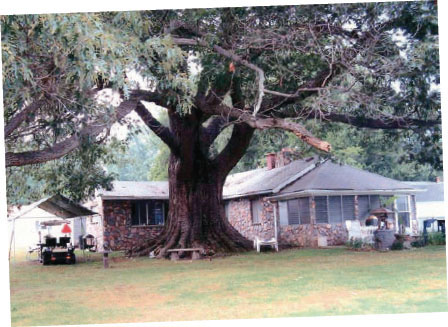
Luke Sydnor’s big oak tree
Their parents first came to Colonial Beach as a young couple and their dad started building a house for the family in the late ’30s or early ’40s. In their yard was a big black oak tree, estimated to be over 250 years old, that was the family’s pride and joy. There were stories that Robert E. Lee had once sat under that very tree as a child. Betty and Edna recall sitting under the shade of that tree to read or play. Out of respect they didn’t climb it. Around town it was admired for its historic age and spreading branches. And when it was eventually felled by Hurricane Isabel, there were tears shed.
So many of their best memories are tied to this town, to building and to growing up during carefree summers here. They learned to cut grass with a sickle and to use rakes to deal with the thousands of leaves from that big old oak.
Edna recalls helping her father sand boards as he built the kitchen. Luke remembers mixing up rock salt and water to kill the weeds. “That was our Roundup,” he says.
At one point, with their father using every spare minute to work on the house, they remember him being cited by Captain Joe Miller, the police chief, for working on a Sunday, which was against the state’s “blue” laws at the time.
Edna learned to drive a car at the beach. “But she couldn’t get it in Reverse,” Betty taunts. “She threw Luke and Daddy into the front. Luke hit the mirror.”
Their parents had planned to retire to the beach. Sadly, though, their father died on June 19, 1964. He was set to retire on July 1. Though he’d spent many a weekend working on the house, he never had the chance to live in it full-time.
“Back then everybody knew everybody by name,” Edna says. “And they knew your mother.” Which meant that any mischief, no matter where it happened, was likely to be reported right back to your parents.
People walked places or rode their bicycles. “Luke, as the baby brother, had to be watched over,” she says. They’d walk to Denson’s for kerosene for the stove or groceries. They walked to the icehouse to get a twenty-five-cent block of ice, and pulled it home in their little green wagon. They used that ice to make ice cream in an old churner.
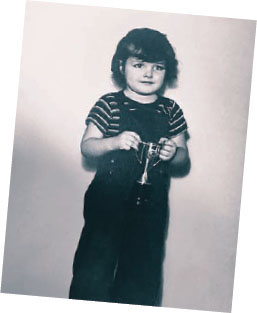

“We made quite a bit of ice cream. That was the most fun,” Edna recalls. “Our mother would tell us there was no need to discuss who would get to lick the paddles—that was her decision.”
Though the children went to retrieve the ice, many items were delivered house-to-house in those days. Farmer’s Creamery from Fredericksburg delivered milk and Charles Chips would bring potato chips.
One of their favorite local door-to-door produce salesmen in that era was Joe Roy. He was an African American Baptist minister who lived out in the nearby countryside and farmed. He would come around with a team of horses, selling produce. They especially loved the watermelon and cantaloupes. “He’d take a plug out of the watermelon so the customer could taste it,” Luke says.
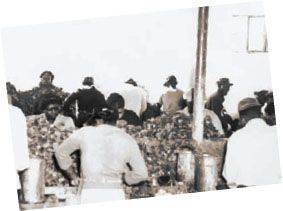
Oyster shuckers at Curley’s
“I thought that was so neat,” Luke adds. He’d spend over four hours riding through town with Mr. Roy, while the man’s grandson, Dallas, would ride along beside the wagon on Luke’s bike. “I’d drive the team of horses.”
“Mr. Roy never came to the front door,” Edna remembers. If he and Dallas were invited to join the family for a meal, it was served on a picnic table in the backyard. It was a sign of the times that they didn’t feel comfortable coming inside.
Even so, the families were so close that when their father died, their mother gave Mr. Roy his clothes, Betty recalls, choking up at the memory.
Though they had a lot of freedom in those days, Luke was very firmly instructed to stay away from Curleys’ oyster packing plant and the store where the rough-and-tumble oystermen hung out. He was told “it was not a place for youngsters.” That didn’t stop him.
He loved watching the African American shuckers working. “They’d sing gospel music and get this rhythm going. I’d stand there just to listen. We didn’t have recorders then, but I wish I’d been able to record it.”
There was almost always someone who’d pop the top off a bottle of soda and hand it to him as he listened. He’d nurse that Coke as long as he could.
The boardwalk was the liveliest place in town during those days. There were several open-door bingo parlors with gaudy prizes on display. The sound of people calling out “Bingo,” echoed outside. At that time, players marked their cards with kernels of corn, rather than the markers used today.
Luke and his friends also made a little money “reserving” benches for the grown-ups who liked to sit along the lively boardwalk and watch people. “We’d lay down on the benches until our customers came along. They paid us twenty-five cents for holding a bench for them, and we’d go off and spend it on something.”
The Sydnor siblings remember remember the workboat races on Monroe Bay, when boats mostly owned by Mr. Curley, Pete Green and George Townsend competed. There was a ski club that did shows on the bay.
“They didn’t have the money for fancy boats or costumes,” Luke recalls. “But everything they did at Cypress Springs in Florida, they did here. People made donations to help them out.”
They speak longingly of the Panzer bakery and the aroma of the rolls, especially on a Sunday morning. Luke recalls that his friend Sugie Green, who married oysterman Pete Green, worked at the old A&P as a cashier. “They had a big old manual cash register. I’d be mesmerized by that,” he says.
They all lament that so many of those old ways have been lost. “We claim to be tourist-friendly, but we’re not,” Luke says with a deep sense of regret. “We claim to be business-friendly, but we’re not.”
All three of them have taken active roles in their adopted town over the years. Luke attends almost every Town Council meeting. He’s worked with the Chamber of Commerce on events. Edna belongs to the Colonial Beach Historical Society. Betty participated in many of the Potomac River Festival parades as a clown.
Betty recalls the days when the beach was known far and wide as the Playground of the Potomac. “A summer population explosion happened then,” she says. “But there was such serenity, such joy, such comfort” in days gone by, Betty says.
And while some of that may be missing now, their love for the beach remains strong and their ties here deep. Not a one of them shows any signs that they’re ready to stop fighting to make it that way again.
